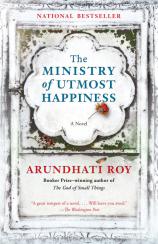The Ministry of Utmost Happiness
Review
The Ministry of Utmost Happiness
Twenty years after the publication of her critically acclaimed and popular Booker Prize-winning novel THE GOD OF SMALL THINGS, Arundhati Roy has returned to fiction with THE MINISTRY OF UTMOST HAPPINESS. It is a novel that fearlessly confronts Indian conflicts and culture with a keen, critical and caring intelligence, as well as with a searing wit. A diverse and loosely related collection of quite compelling characters expose readers to a variety of perspectives on everything from love and family to politics and gender in modern India.
The book opens with a hijra named Anjum. Raised as a boy named Aftab, Anjum came to live with other transgender individuals as a teenager. After a life of adventure and admiration, Anjum retires to a cemetery and eventually creates her own home and community there. Living with her among the graves at what comes to be called the Jannat Guest House and Funeral Services is a young man named Saddam Hussain. Having suffered oppression and witnessed terrible violence as a low caste Hindu, he has remade himself as a Muslim and supports himself with several entrepreneurial enterprises.
"THE MINISTRY OF UTMOST HAPPINESS is sure to seal Arundhati Roy’s reputation as a novelist of grace and acumen."
The pair offers safe haven to others, including the mysterious Tilo and Miss Jebeens, the newborn baby she has “kidnapped.” Tilo is the enigmatic object of affection of three men: Musa, Naga and Garson Hobart, the four having met in a college theatrical production. After school, the friends, with Musa and Tilo a married couple, find that their youthful idealism is challenged by the realities of career and social expectations, as well as the ongoing struggles in Kashmir.
While a lot happens in THE MINISTRY OF UTMOST HAPPINESS, this is a character- and idea-driven novel. It takes place in liminal spaces --- intersections, edges and graveyards. The people, too, seem “between” or other. They often have multiple or hidden identities and find the need to retreat from their own pasts to survive. Roy asks her readers to do some heavy lifting, and in her most successful moments offers them amazing insights that are specific to India and completely universal. However, she moves between the interlocking stories of her characters with an abruptness that is jarring. She also moves between styles, mostly using a carefully descriptive narrative but peppering it with surreal asides, police reports, strange and dreamy passages, the last ravings of a dying woman, bits of poetry, philosophy and more.
The novel sometimes feels cluttered, but there is much to enjoy and savor as the plot lines, figures, symbols and meanings are sifted through. The story is almost cubist in its use of surprising perspective, reflecting, of course, the splintered lives and viewpoints of its characters. This is also a fiercely political novel, which should come as no surprise to those familiar with Roy’s nonfiction work. Still, it remains totally humane and compassionate throughout. And, in the end, Roy is able to tie together all the disparate pieces and deliver a strong, moving and impactful conclusion.
THE MINISTRY OF UTMOST HAPPINESS is sure to seal Arundhati Roy’s reputation as a novelist of grace and acumen.
Reviewed by Sarah Rachel Egelman on June 9, 2017
The Ministry of Utmost Happiness
- Publication Date: May 1, 2018
- Genres: Fiction
- Paperback: 464 pages
- Publisher: Vintage
- ISBN-10: 052543481X
- ISBN-13: 9780525434818




